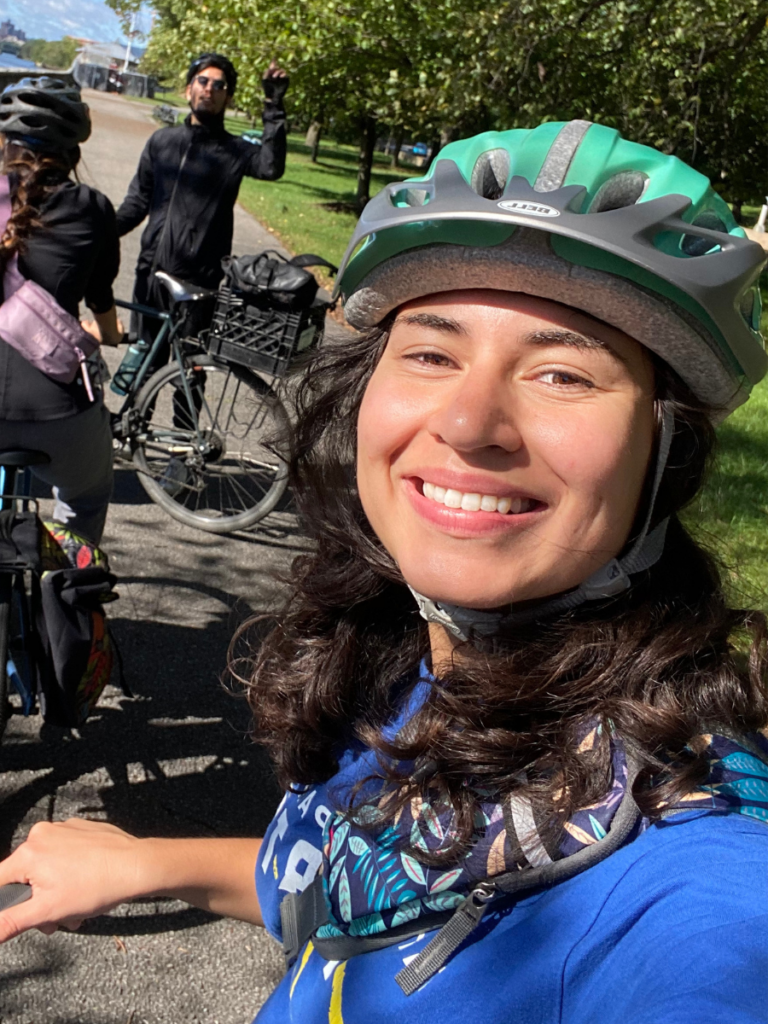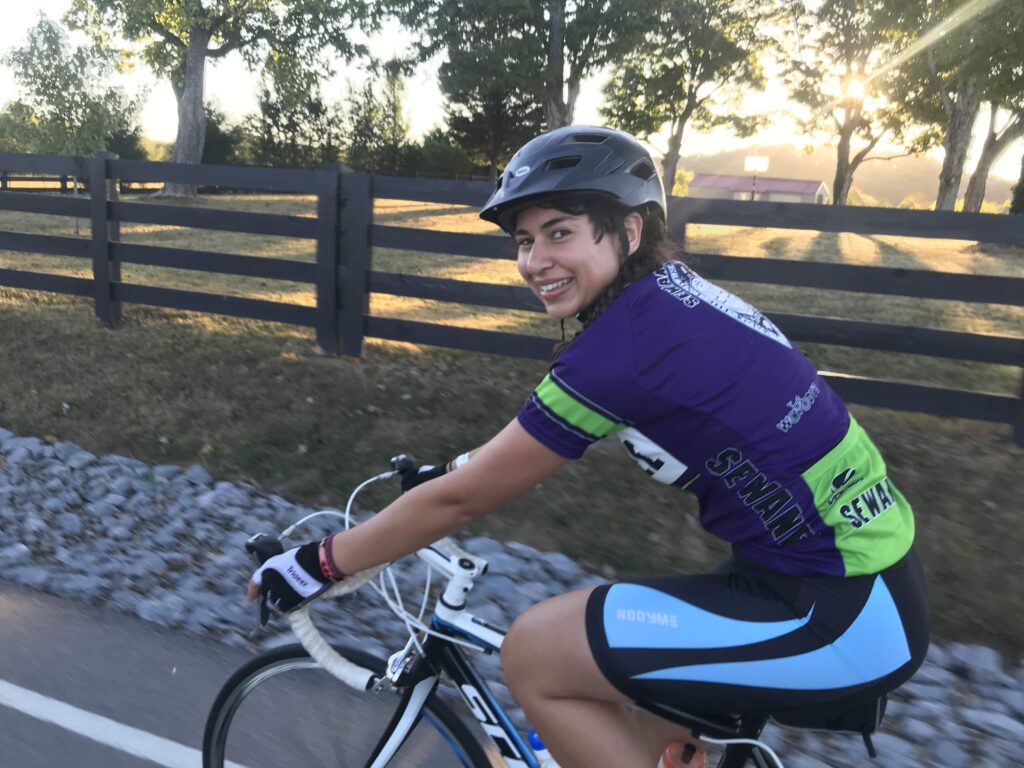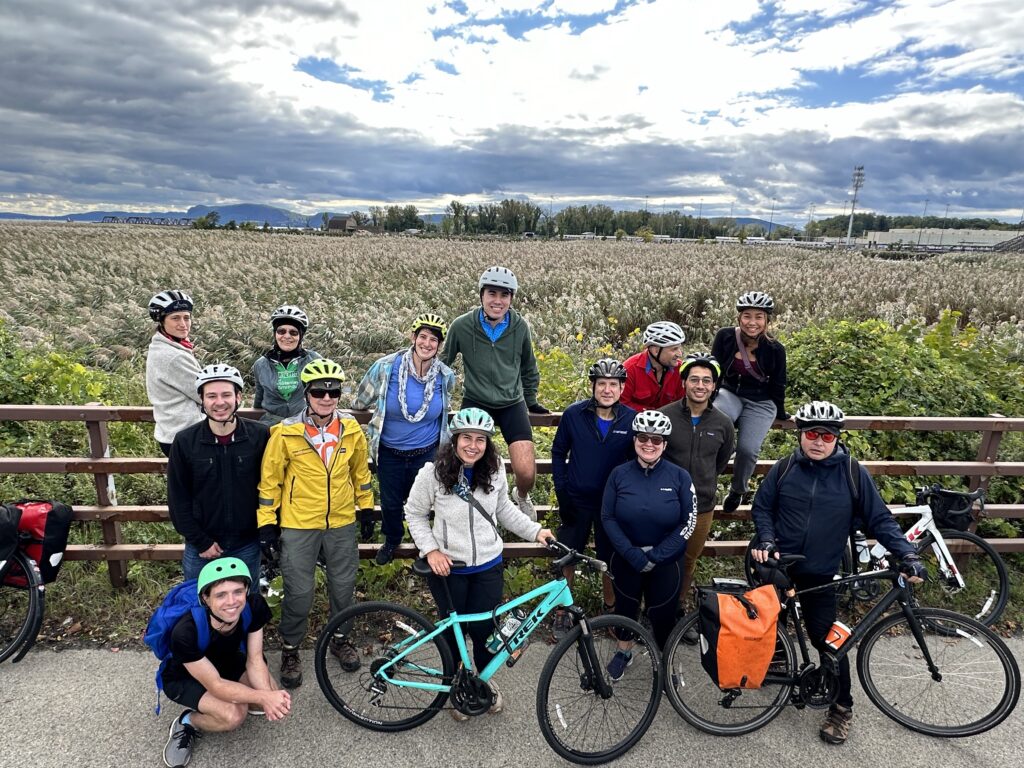DISCOVER YOUR LOCAL BICYCLING COMMUNITY
Find local advocacy groups, bike shops, instructors, clubs, classes and more!
LCI Spotlight: Lauren Newman
The League certifies hundreds of League Cycling Instructors every year and there are thousands of LCIs across the country leading bike education efforts in their communities. In our LCI spotlight series, we share the stories of League Cycling Instructors doing what they do daily: educating, mentoring, and empowering. You don’t have to be an extraordinary athlete or overachieving student to be a stellar LCI, all you need is the conviction that life is better for everyone when more people ride bikes.
This month, we’re excited to introduce you to Lauren Newman, Youth & Schools Organizer for Transportation Alternatives (TA). For 50 years, TA has led the movement for safe, equitable streets in New York City. Lauren joined their ranks last September, bringing her youth organizing experience to help NYC’s young people transform their city’s streets for the better. “Lauren has this incredible ability to connect with young people and inspire them to see the power they have to create change,” shared Nicole Rodriguez, Transportation Alternatives’ Events and Partnerships Manager. “Her passion and dedication make her an amazing role model for the next generation of leaders.” Get ready to be inspired as we take a closer look at Lauren’s journey as a cycling educator and youth organizer.

Know an inspiring LCI we should feature next? Nominate a stellar bike educator here!
Tell me a little about yourself and your background.
I grew up in Washington DC and consider it my home base, even though I moved around a lot growing up. My formative years were spent in DC, so I relied a lot on public transit. When I got old enough, biking was my favorite form of transportation. I had a friend who was passionate about biking to school but the four-mile commute made me wonder, do I really want to start my day all sweaty? Not to mention how scary rush hour traffic sounded. Eventually, my friend convinced me to try taking the scenic route. She lived near Capitol Hill so I would bike up Pennsylvania Ave through protected bike lanes. The experience was so liberating. At that point, I was like okay, well now I’m hooked!
Even then, I didn’t see cycling as part of my identity, more of an activity that I enjoy doing. Fast forward to five years ago, when I was living in rural Tennessee at The University of the South. I joined the Sewanee Outing Program and signed up to participate in the MS 150 even though I’d never ridden more than six miles at a time.To train for that 150 miles, I started riding up and down the mountain the university is perched on. Going down the mountain was a blast, but I had no idea how hard it would be to make that five-mile climb back up. It helped me recognize my limits and see how my capacity could expand. This was the first time I recognized cycling can be such a physically empowering experience.

Recently, I moved to New York City to study urban planning at NYU Wagner. When I moved here, I applied to join Transportation Alternatives for their Youth & Schools Organizer position, having little to no professional transportation experience but lots of youth work experience. I’ve been learning a lot about how we make cities more friendly to active transportation modes and finding ways to dig deeper into this passion.
What first motivated you to become an LCI?
I was invited to be an LCI after joining Transportation Alternatives — TA wanted to get into Learn to Ride and Smart Cycling events as a form of advocacy, and I was the natural person to take this course because of my work with young people. I didn’t even realize that becoming an LCI was a thing before my organization recommended it. I’m still new to bike education but I see it as an important skill set for people of all ages to learn how to navigate their communities and take agency over their transportation.
In your experience, what role does cycling play in empowering youth?
I’ll share a firsthand example — I serve on the National Youth Bike Summit Steering Committee and earlier this year, I went to my first Youth Bike Summit. The youth who attended were all ages from elementary school through college, and I was in awe to see them all engage with cycling as a powerful form of expression. In particular, I connected with a group of young people from Georgia, the BRAG Dream Team, who combined cycling with advocacy to honor Ahmaud Arbery’s family. During the pandemic, they organized social rides as a way to uplift the Black Lives Matter movement and raise awareness of the violence we continue to see against Black people. The fact they were able to connect these passions and inspire other people in the community to mobilize in this way was really incredible. Following the conference, they did an East Coast ride from Miami to Maine. When they made it to NYC, I was able to lead them on their route through the city. Cycling can be such a powerful tool for mobilizing both at a community level and an individual level — thinking of what biking has meant for me and my own body, I see it as a way to uncover our capacity and liberate ourselves.
If you are part of a community that is underrepresented in cycling (such as adaptive cyclists, BIPOC, or LGBTQ+ communities), feel free to share about your experience and how it shapes your approach to cycling education.
I’m mixed, half-black and half-white. I think there can be a stigma of seeing biking as this elite sport. There’s a perceived difference between “cyclists” vs. “people riding bikes”, and a difference in who we talk about and visualize in these spaces.
Thinking back to when I was convincing my parents to let me bike to school in high school, it was a lot harder to convince my dad. He didn’t see biking as transportation. He had this perspective that cycling, riding bikes, was something you did in the park, off the street, in a “safe” environment. I tried to push back and say, I’m old enough, you can trust me. But because of his lived experience, he was like, “I trust you, but I don’t trust all the people around you.”
To me, it’s about being able to change the narrative around cycling as a form of transportation for everyone. Bikes are an empowering tool to get places and boost an active lifestyle, and it’s an experience everyone should be able to access.
What is your favorite thing about being on a bike?
I love hopping on my bike and feeling the breeze — at least in the summertime, because that East Coast winter wind can be pretty unbearable. I love going places on my own, and my bike gives me the ability to get up and go whenever I want. Of course, I can do that on foot but a bike makes it a lot faster and more joyful! The freedom of riding my bike and feeling the fresh air is just so invigorating.

What is your favorite memory from being on a bike?
During the peak of the pandemic, I was going stir-crazy. I lived in DC at the time and they had shut down Beach Drive and Rock Creek Park to car traffic so that people could get some fresh air. On weekends, I would hop on my bike and head to Rock Creek Park, a 50-mile round trip out to Lake Needwood in Rockville. The route was basically all trails the entire way, and it was such a freeing experience. I’ve said freedom a lot, but that’s what I associate most with biking! I loved the chance to get out of my headspace of being stuck in quarantine — to simply hop on my bike and pedal myself to a lake dozens of miles away. It was special having that opportunity come about because the city realized people needed to get outside, and they chose to de-prioritize cars and reclaim these streets for people.
Give us an interesting or funny fact about you.
I used to manage a youth entrepreneurship program in DC where I helped teens develop relationships with nature, food, and each other through gardening-based education and activities. A lot of the students I worked with were recent immigrants from Latin America, so I learned a lot of garden- and food-based vocabulary in Spanish. So while I’m not fluent, take me to the garden and I can point out pretty much anything in Spanish!
Do you or Transportation Alternatives have any upcoming events going on or news that you’d like to share about?
One of my responsibilities when I was hired was to kickstart TA’s first fully-youth-led Activist Committee. I am proud to share that they just launched their first campaign, Bike More! The goal is to advocate for $5 Citi Bike memberships for all public high school and CUNY students above the age of 16. New York City has one of the most expensive bike-share systems in the country because it’s not publicly funded. We are advocating for that to change so more youth can access the freedom of biking.